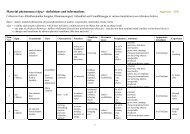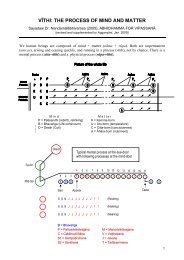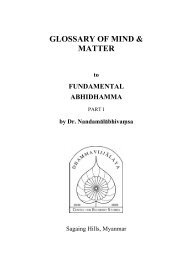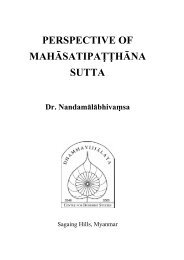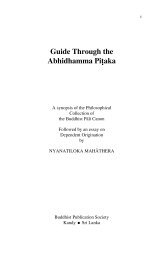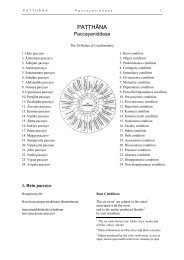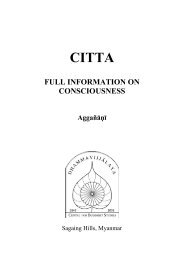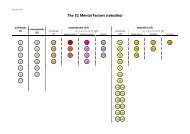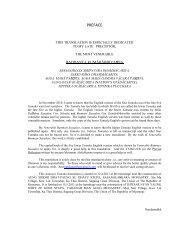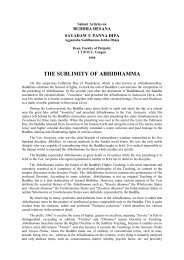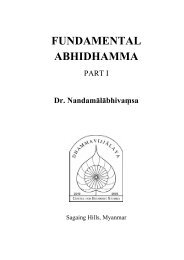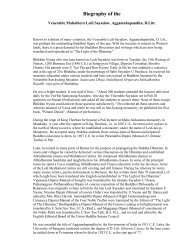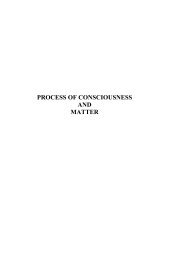ABHIDHAMMA IN DAILY LIFE - Abhidhamma.com
ABHIDHAMMA IN DAILY LIFE - Abhidhamma.com
ABHIDHAMMA IN DAILY LIFE - Abhidhamma.com
Create successful ePaper yourself
Turn your PDF publications into a flip-book with our unique Google optimized e-Paper software.
if the sharing of merit is after donating alms-food, the departed one will be instantly appeased<br />
from hunger by saying, “Well-done” "Sadhu!", if the donation is garments and robes, the<br />
deceased will be<strong>com</strong>e well clothed upon saying, “Well-done” . It is utmost importance that in<br />
giving alms in dedication to the deceased, the recipient should be worthy of alms.<br />
Example - Once upon a time, the bereaved members invited an immoral monk and offered alms<br />
in dedication to the departed. When merits were shared, the deceased who was a ghost – (peta)<br />
by then, did not receive his due. Therefore, he yelled to his relatives, "The evil monk is robbing<br />
my share of merits." Therefore, the relatives had to repeat the charity to a virtuous monk. Only<br />
then the ghost received his share and was free from miserable existence.<br />
The above incident gives us a lesson.<br />
• When we dedicate our charity to a departed friend or relatives we must first get rid of our<br />
anguish and grief.<br />
• Then only we should offer food, robes, umbrella, slippers, monasteries, etc. to the monks.<br />
By offering alms, the ghost gets food. By offering robes, the ghost gets clothes to wear. By<br />
offering monastery, the ghost gets a dwelling place. For almsgiving, we ought to invite a good<br />
monk; or should perform offerings to the order of Monks (Sanghika Charity) meant for the entire<br />
Order of Sangha. Prior to this Charity, we should invite the deceased to be present at the<br />
liberation. (They will <strong>com</strong>e if they can). Then we should loudly and distinctly call the deceased<br />
by name and share the merits gained.<br />
6.12d Today's Ritual<br />
Most people today, after their bereavement, do not care to choose good Bhikkhus. Neither do<br />
they get of their anguish and sorrow. They offer alms and even cash to the monks at the cemetery<br />
as a routine duty, just to escape blame and get praise from others. Then they share the merits<br />
gained without thinking deeply of the benefits of the deceased.<br />
It is far better to offer alms at home with a mind free from grief than to do so at the cemetery<br />
while being afflicted with lament and sorrow. However, good deeds done and alms given at the<br />
cemetery will also produce merits if performed without lamentation.<br />
6.12 d Who Received the Merit Shared.<br />
The deceased who have who have be<strong>com</strong>e hungry ghosts – (peta) can receive the benefits form<br />
sharing of merit only when they are present in the vicinity. If they are reborn as humans, as<br />
animals or as hungry ghost in the remote jungles, they cannot receive the share of merits.<br />
However, other dead relatives who are now ghosts in the vicinity, can rejoice in these<br />
benedictions and can be reborn in other good planes of existence. Therefore, we should continue<br />
to practice this practice of sharing of merits.<br />
6.13. Listening To The Dhamma - Dhammasavana<br />
Page 61 A Gift of Dhamma Maung Paw, California



